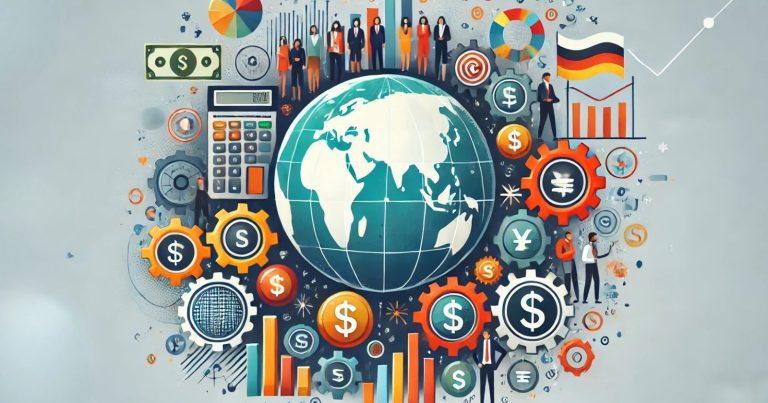The International Monetary Fund (IMF) is a global institution that offers financial support and ensures international economic stability by lending and advising on policies to member nations with economic problems. The role of the International Monetary Fund (IMF) is to ensure global financial stability. Founded to promote international monetary cooperation, the IMF offers financial assistance to nations with balance of payment problems. The IMF stabilizes economies and fosters sustainable economic growth by providing financial support and policy guidance. This article will examine the IMF, its characteristics, its critical role in world finance, and its connection with India.
What is International Monetary Fund?
The International Monetary Fund (IMF) was founded in 1944 to foster global economic growth and stability. It was formed to promote international collaboration in monetary issues and to lend money to nations experiencing economic difficulties. The IMF assists nations in stabilizing their currencies, keeping their economies growing, and maintaining balanced financial and trade policies. For instance, the IMF assisted Greece during its financial crisis 2010 by issuing loans in return for enacting austerity and economic reforms.
Features of International Monetary Fund
The International Monetary Fund has important features that distinguish it from other international institutions. To that, we would call the breadth and depth of its governance mechanisms, including its funding modalities and the services it offers to its member countries.
- Members and Governance: The IMF has 190 member countries, each having a vote proportionate to their financial contribution (quota). The larger a country’s quota, the more power it wields over IMF decisions.
- Quotas and Financial Resources: The financial contributions from member countries to the IMF, which determine their voting power and access to economic resources, are called quotas. The sum of these quotas is the IMF’s financial base, which is tapped to lend to needy countries.
- Programs for Financial Assistance: The IMF extends several forms of loans to countries with difficulties with balance of payments. Such programs tend to be conditional, requiring the country being loaned to commit to economic reforms.
- Surveillance and Monitoring: The IMF analyzes and monitors global economic trends and provides country-specific policy advice to enhance the financial stability of its members. It releases periodic reports like the World Economic Outlook that assess the global economy.
- Capacity Development: The IMF assists countries in strengthening their economic and financial policies.
Role of International Monetary Fund
The role of international monetary is diverse because the organization is at the core of maintaining economic stability in the world, assisting nations with money, and maintaining the smoothness of the global monetary system.
Providing Financial Assistance
A primary function of the IMF is to lend money to countries in a financial crisis. The IMF provides loans to stabilize the economy, usually with conditions that apply in the short run. This may be followed by conditionality, where debt relief is accompanied by requirements imposed by international financial institutions or donor countries to implement economic reforms (fiscal corrections, policy adjustments) to restore stability and growth.
Promoting Economic Stability
The IMF helps maintain global financial stability by providing the economic system with liquid resources, enabling countries to overcome problems due to inflation, currency issues, and balance of payment issues. As a provider of policy advice and financial support, the IMF ensures that countries have the means to mitigate the risks of economic instability. This helps to create a more stable global economy that is better able to withstand shocks and immune to such patterns of crisis, which ultimately benefits all member states.
Preventing Currency Crises
The IMF assists countries threatened with currency crises like rapid devaluation or other financial instability. It helps prevent such crises from having far-reaching negative consequences on the global economy through its guidance and assistance. Countries need to be ready to act so the IMF’s support means countries can do what is necessary to support their currencies and economic stability.”
Enabling the Economy and Trade
The IMF’s primary role is to foster the global economy’s growth by encouraging sound economic policies and good practices. It urges nations to enhance trade policies and construct better investment conditions. By fostering an open and stable financial environment, the IMF helps growth, making it easy for countries to trade and get investment, which is the path to long-term prosperity.
Promoting Global Cooperation
The IMF facilitates international monetary cooperation through close collaboration with its member nations. It responds to world economic problems, including managing financial crises and resolving system problems in world trade. Through cooperation, the IMF facilitates a collective response to world economic problems shared by all the participating nations.
Relationship Between India & IMF
India is one of the IMF’s biggest members, and that makes a difference. India has collaborated with the IMF through good and difficult times over the years, having contributed to the IMF and benefiting from its resources and policy advice. The country has also played a central role in global financial affairs.
- Financial Support and Assistance: Whenever India faced an economic crisis, the IMF prolonged its help, like in 1991, when the nation was on the verge of a balance of payments crisis. India introduced economic reforms that liberalized its economy with the support of the IMF.
- Economic Reforms and Policy Counsel: The IMF has collaborated with India as it sought to reinforce its financial institutions, adjust its monetary policies, and maintain fiscal discipline. India has also received technical assistance in tax reform and financial sector development.
- India’s Active Participation in IMF Decision-Making: India is one of the top 10 quota-based contributors to the IMF and commands significant voting rights. Its representatives partake fully in IMF discussions and policy decisions.
- Economic Cooperation and Growth: India’s relationship with the IMF has become a key player in the global economy. The IMF remains committed to supporting India’s economic growth and development, advising on critical issues, including inflation management, exchange rate dynamics and fiscal policy.
Example of India & IMF
India underwent a foreign exchange crisis in 1991 and had to go to the IMF for assistance. In return for the loan, India implemented various economic reforms, including devaluation of the rupee, reduction of import tariffs and liberalization of foreign investment policies. That laid the foundation for India’s accelerated economic growth in the following decades.
International Monetary Fund FAQs
1. What is the IMF’s main role?
The main role of the IMF is to supply money to countries that are suffering from balance of payments issues and to enhance cooperation on monetary affairs at an international level.
2. In what ways does the IMF help countries during crisis times?
The IMF gives loans to distressed countries, along with recommendations on policies and requirements for effecting economic adjustments in order to reestablish stability.
3. What is India’s role in the IMF?
India is an important member of the IMF, providing global financial stability, availing financial assistance, and being actively involved in decision-making.
4. How was the IMF founded?
The IMF was founded in 1944 at the Bretton Woods Conference to encourage international monetary cooperation and maintain global financial stability.
5. How does the IMF affect global economic policies?
The IMF tracks emerging global economic trends, makes policy recommendations to member governments, and maintains international cooperation to provide stability and growth in the economy.


